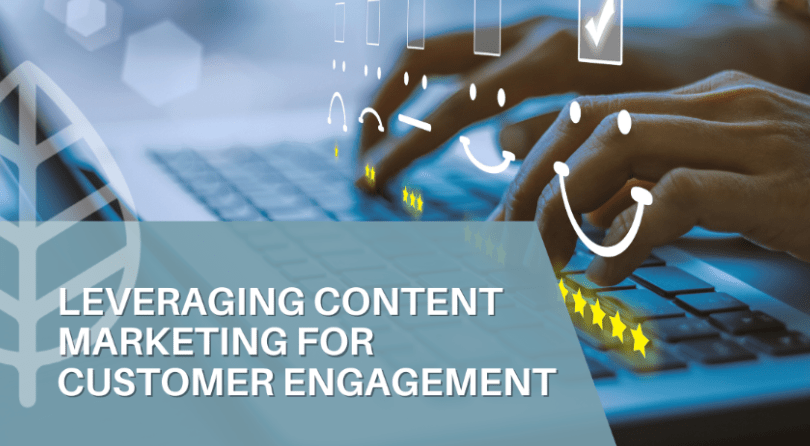Customer engagement is a critical factor for small businesses striving for long-term growth. Engaged customers are not only more likely to make repeat purchases, but they also refer friends, leave reviews, and provide valuable feedback that can help refine products or services.
Building strong connections with your audience fosters loyalty and positions your brand as trustworthy and reliable. Content marketing is a strategic, cost-effective way to achieve this, providing meaningful experiences that attract, educate, and retain customers. Through well-planned content, small businesses can create conversations that resonate with their audience and encourage ongoing interaction.
Understanding Customer Engagement
Customer engagement refers to the emotional and interactive connection between your business and its audience. It goes beyond simply generating views or clicks. True engagement reflects how invested your customers are in your brand. High engagement correlates with increased trust, improved customer loyalty, and stronger word-of-mouth promotion. Businesses that actively cultivate engagement often see higher conversion rates and longer customer lifecycles.
Engagement can be measured through a variety of metrics, including:
- Time spent on a page
- Social media shares and comments
- Responses to email campaigns
- Repeat visits to your website
- Interaction with interactive elements like quizzes or polls
Understanding which types of content generate the most engagement allows businesses to refine strategies, prioritize effective formats, and better meet audience expectations.
Content Marketing Strategies to Increase Engagement
- Interactive Content: Interactive content encourages active participation from your audience, creating memorable experiences that foster connection. Examples include:
- Quizzes that help customers discover products or services tailored to their preferences
- Polls that ask for opinions on upcoming product launches
- Surveys that gather customer feedback for future improvements
- Contests that reward participation with discounts or freebies
For example, a fitness studio could create a quiz to recommend personalized workout plans. Participants are likely to share results on social media, extending the reach of your brand and generating organic engagement. Similarly, an online boutique could host a “Style Your Outfit” contest, encouraging customers to submit photos and tag your brand, increasing both visibility and participation.
- Personalized Email Campaigns: Email marketing remains one of the most effective tools for small business engagement, particularly when personalized. Segmenting your email lists based on behavior, purchase history, or demographics ensures that the right content reaches the right audience.
Personalized campaigns can include:
- Birthday discounts or promotions
- Product recommendations based on previous purchases
- Tailored newsletters highlighting content relevant to subscriber interests
When customers receive content that aligns with their needs, they are more likely to open, read, and act on your emails. This personalized approach also signals that your business understands and values each customer, strengthening the emotional connection.
- Social Media Interaction: Social media is not just a broadcasting tool; it is a two-way channel for engagement. Consistently posting high-quality content and responding to comments or direct messages demonstrates that your business values feedback.
Engagement strategies include:
- Responding to customer questions and acknowledging comments
- Hosting live Q&A sessions or webinars
- Sharing behind-the-scenes content to humanize your brand
- Encouraging followers to tag friends or share their own experiences
By actively participating in conversations, small businesses build community, increase loyalty, and show that they are approachable and customer-focused.
- User-Generated Content (UGC): Encouraging customers to create content for your brand builds authenticity and trust. UGC can take the form of testimonials, reviews, social media posts, or photos featuring your products.
Benefits of UGC include:
- Providing social proof to potential customers
- Boosting engagement as people share their own experiences
- Reducing content creation workload for your team
For example, a local coffee shop could encourage patrons to post photos of their favorite drinks using a branded hashtag. Sharing these posts on your official social accounts fosters a sense of community and encourages further participation.
Storytelling for Engagement
 Storytelling is a powerful way to humanize your brand. Sharing narratives that feature employees, customer experiences, or behind-the-scenes insights allows your audience to connect emotionally with your business. HubSpot research shows that 60% of consumers feel more connected to brands that provide helpful content consistently.
Storytelling is a powerful way to humanize your brand. Sharing narratives that feature employees, customer experiences, or behind-the-scenes insights allows your audience to connect emotionally with your business. HubSpot research shows that 60% of consumers feel more connected to brands that provide helpful content consistently.
Examples include:
- A bakery telling the story of a family recipe behind a signature pastry
- A fitness trainer sharing client success stories
- A boutique highlighting the process behind hand-selected seasonal collections
Authentic storytelling inspires trust, encourages repeat engagement, and differentiates your business from competitors by showing the human side behind the brand.
Content Distribution for Engagement
Creating great content is only part of the process. Distribution ensures that your efforts reach and resonate with your audience.
- Multi-Channel Approach: Distribute blogs, social media posts, and newsletters across multiple platforms to maximize reach.
- Video Content: Short videos or live streams encourage interaction and help retain attention. Platforms like Instagram Reels, TikTok, and YouTube Shorts are ideal for engaging younger demographics.
- Community Forums: Participate in niche discussions or industry forums to build credibility and demonstrate expertise.
By reaching customers where they are most active, small businesses increase opportunities for engagement and create a consistent brand presence.
Measuring Engagement
Monitoring analytics is essential to understanding the effectiveness of your engagement strategy. Metrics to track include:
- Social media likes, shares, and comments
- Blog interactions, including scroll depth and time on page
- Email open and click-through rates
- Repeat website visits and user behavior
Analyzing these insights allows businesses to identify successful content, adjust strategies, and focus on high-performing approaches. Over time, data-driven adjustments ensure continuous improvement and higher engagement levels.
Advanced Tips
- Use AI Tools: AI can automate personalization, optimize posting times, and segment audiences for targeted campaigns.
- Encourage Feedback: Surveys and comment prompts allow customers to share opinions, improving content relevance.
- Repurpose High-Performing Content: Turn successful blog posts into videos, infographics, or email series to extend reach and engagement.
- Consistency is Key: Maintaining a regular content schedule builds anticipation and loyalty among your audience.
Why The AD Leaf
The AD Leaf specializes in content marketing strategies designed to maximize customer engagement. We help small businesses craft personalized campaigns, develop interactive content, and implement multi-channel strategies that foster meaningful connections.
By tracking analytics and refining campaigns, The AD Leaf ensures your content not only reaches your audience but inspires interaction, builds trust, and drives loyalty. Partnering with The AD Leaf transforms content marketing into a tool for growth, turning casual visitors into loyal customers and advocates for your brand.


